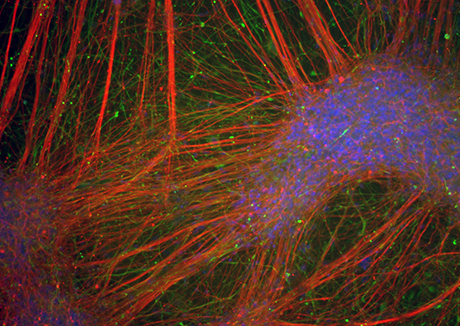Navigation auf uzh.ch
Navigation auf uzh.ch

For decades, intensive research has been conducted on drugs all over the world to treat Alzheimer’s patients. Although major progress has been made in diagnostics (the disease can be detected increasingly early and accurately), the therapeutic options remain limited. Together with researchers in Switzerland, Germany and India, the team headed by Professor Lawrence Rajendran from the Systems and Cell Biology of Neurodegeneration at the Institute of Regenerative Medicine of the University of Zurich has now developed a targeted substance that blocks the pathogenic function of an enzyme in the cells without affecting its other vital functions.
Protein deposits in the brain are hallmarks of Alzheimer’s disease and partly responsible for the chronically progressive necrosis of the brain cells. Nowadays, these plaques can be detected at very early stages, long before the first symptoms of dementia appear. The protein clumps mainly consist of the β amyloid peptide (Aβ), a protein fragment that forms when two enzymes, β and γ secretase, cleave the amyloid precursor protein (APP) into three parts, including Aβ, which is toxic.
If β or γ secretase is blocked, this also inhibits the production of any more harmful β amyloid peptide. Consequently, for many years biomedical research has concentrated on these two enzymes as therapeutic points of attack. To date, however, the results of clinical studies using substances that block γ secretase have been sobering. The problem is that the enzyme is also involved in other key cell processes. Inhibiting the enzymes in patients therefore triggered severe side effects, such as gastrointestinal hemorrhaging or skin cancer.
Thus, for a number of years researchers have also been focusing their efforts on β secretase. A large number of substances have been developed, including some highly promising ones that reduced the amount of Aβ in mouse models effectively. Nevertheless, according to cell biologist Rajendran, this presents the same challenge: “The current β secretase inhibitors don’t just block the enzyme function that drives the course of Alzheimer’s, but also physiologically important cell processes. Therefore, the substances currently being tested in clinical studies may also trigger nasty side effects – and thus fail.”
To address this, the first author on the publication, Saoussen Ben Halima in the lab of Professor Rajendran, and her fellow researchers studied how β secretase might be inhibited selectively – in other words, the harmful property blocked without affecting any useful functions. In a series of experiments, the scientists were able to demonstrate that the Alzheimer’s protein APP is cleft by β secretase in endosomes, special areas of the cells that are separated by membrane envelopes, while the other vital proteins are processed in other areas of the cell. The researchers exploited this spatial separation of the protein processing within the cell.
“We managed to develop a substance that only inhibits β secretase in the endosomes where the β amyloid peptide forms. The specific efficacy of our inhibitor opens up a promising way to treat Alzheimer’s effectively in future, without causing the patients any serious side effects,” says Rajendran in summary. The researchers’ next goal is to hone their drug candidate so that it can initially be tested in mice and ultimately in clinical studies on Alzheimer’s patients.
Saoussen Ben Halima, Sabyashachi Mishra, K. Muruga Poopathi Raja, Michael Willem, Antonio Baici, Kai Simons, Oliver Brüstle, Philipp Koch, Christian Haass, Amedeo Caflisch, and Lawrence Rajendran. Specific Inhibition of β-Secretase Processing of the Alzheimer’s Disease Amyloid Precursor Protein. Cell Reports. February 25, 2016. doi: 10.1016/j.celrep.2016.01.076